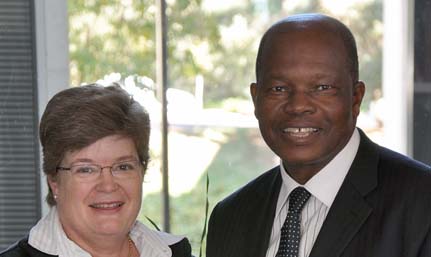Latest News Archive
Please select Category, Year, and then Month to display items
13 August 2024
|
Story Anthony Mthembu
|
Photo Sibahle Dayimani and Amandla Kulu
 Prof Peter Roseel, Managing Director of Management Consulting and Research – a spin-off of the Catholic University of Leuven in Belgium; and Prof Nicolene Barkhuizen, Director of the UFS Business School.
Prof Peter Roseel, Managing Director of Management Consulting and Research – a spin-off of the Catholic University of Leuven in Belgium; and Prof Nicolene Barkhuizen, Director of the UFS Business School.
The Business School at the University of the Free State (UFS) hosted Prof Peter Rosseel, Managing Director of Management Consulting and Research – a spin-off of the Catholic University of Leuven in Belgium – for a guest lecture during his visit to the UFS Faculty of Economic and Management Sciences (EMS).
The guest lecture took place on 19 July 2024 in the Business School Auditorium and was attended by academics from the UFS.
Reflecting on the lecture
The lecture presented by Prof Rosseel focused on how combining strategy, strategy implementation, culture transformation, leadership, and learning successfully leads to sustainable growth, creates engagement, and delivers tangible results. Throughout the lecture, Prof Rosseel spoke about how experts tend to make bad leaders and therefore stop change from happening within an organisation. In fact, he highlighted that, “Experts stop change from happening within the workplace because experts, by definition, look through the eyes of their expertise, but you cannot reduce the world to different forms of expertise, as it is holistic.” As such, he argued that to change an organisation, one must see things from the point of view of others.
Furthermore, Prof Rosseel delved deeper into the hierarchical operating model within organisations. He indicated that the above model should be one community within organisations; however, unfortunately it is not. This is because organisations are made up of several departments such as finance and human resources. As such, he regards these departments to be silos that could prove to be detrimental to organisations, as each silo can create its own culture as opposed to an organisational culture. These are some of the points he discussed throughout the lecture.
After the lecture concluded, the audience had the opportunity to engage with Prof Rosseel on his viewpoints. In fact, Lyle Markham, Academic Head of Department and Lecturer in Industrial Psychology at the UFS, was one of the audience members and described the lecture as insightful.
Valuable advice for businesses in difficult times
2013-04-15
|
 |
|
Prof Helena van Zyl, Director of the Business School, and Dr Reuel Khoza.
Photo: Stephen Collett
15 April 2013 |
Dr Reuel Khoza, Chairman of the Nedbank Group, shared the group’s valuable rules for managing a bank in difficult times in an MBA lecture on the Bloemfontein Campus. Dr Khoza is a visiting professor at the UFS Business School.
He focused in the lecture on the group’s business and leadership model and highlighted some do’s and don’ts:
- Do not surprise your stakeholders on the downside – communicate transparently, particularly when there is bad news.
- Retrenching staff to contain costs should be a last resort – the damage to corporate culture from retrenchments is immense. Follow and support your customers – get as close to them as possible because business changes slowly, but customer behaviour can change in an instant.
- Integrated central capital and funding management.
- Entrench well-established reporting, KPIs and measurement systems.
- Ensure strong independent risk management.
- Manage your cost base – anticipate downturns and re-base your costs to avoid crisis-cost management.
- Take advantage of opportunities – an economic downturn creates a situation where valuations fall and assets are sold off, which can be a great opportunity for acquisitions.
- Keep innovating – innovation does not have to be a costly exercise, as the right culture can promote and encourage experimentation and collaboration.
- Whatever you do – avoid a price war, as expedient pricing decisions may hurt the business in the longer term.